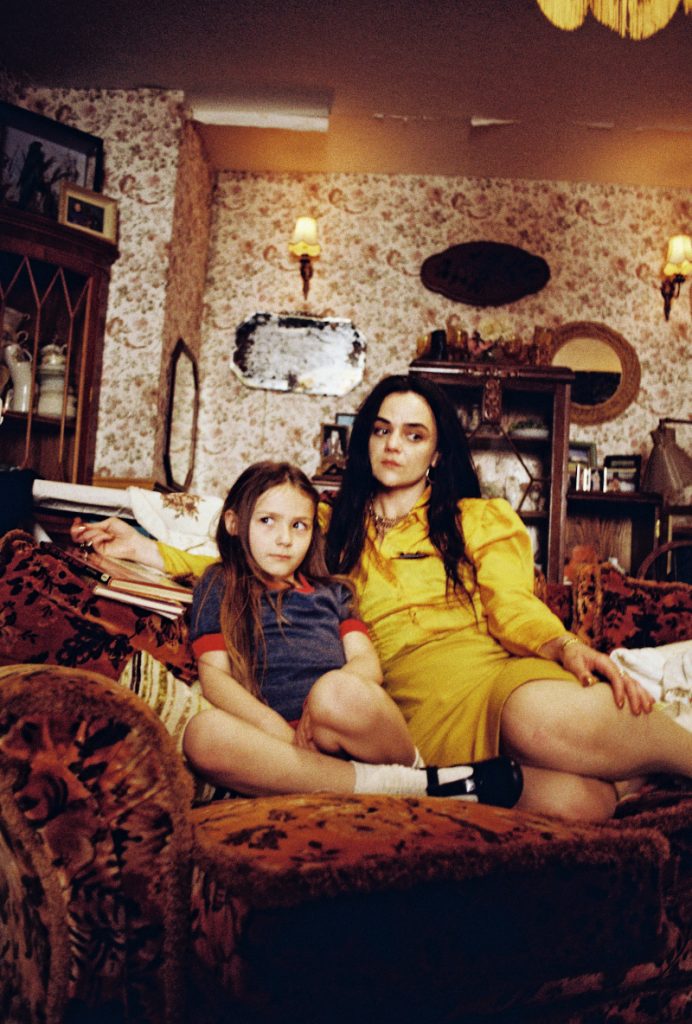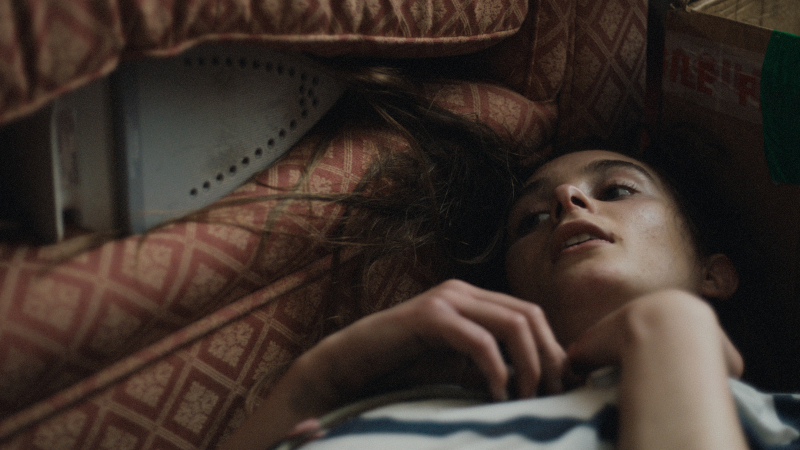Director – Luna Carmoon – 2023 – UK – Cert. – 126m
****
A young girl’s strange relationship with her rubbish-hoarding mother, cut short in childhood, leads to an equally bizarre bond in adult life – out in UK cinemas on Friday, May 17th, with previews from Friday, May 3rd
When I first stumbled across the title of this film, and the image used to promote it of a young couple staring into what I took to be a circular hole, which, I realised after seeing the film, was in fact the outline of a communal bin of the type commonly found on an English housing estate, I guessed it was a thriller – two people stumble upon a hoard: a bag of money or otherwise valuable contents. A noun. However, after viewing, I now realise the title could equally well suggest an activity, a verb. To hoard. The act of hoarding. The state of being which is hoarding. The film isn’t really a thriller. To describe it as a drama might be closer to the mark, but that doesn’t prepare the viewer for how utterly strange and alien the experience of watching this is.
Because the narrative starts off with the relationship between Cynthia (Hayley Squires) and her pre-teenage daughter Maria (Lily-Beau Leach). These two are not just any mother and daughter: they are very unusual. The mother likes to hoard. More specifically, she likes to hoard rubbish. People throw out lots of useful things, and Cynthia’s subconscious mission in life is to rescue those things. She goes out at night with her supermarket trolley, Maria in tow, and brings plastic bags of people’s rubbish back to the family’s small, council estate flat. “I can’t believe it, we’ve got a complete set here,” she says on one occasion, amazed at the things people get rid of.
The flat is covered in rubbish bags and, indeed, rubbish. Somewhere in there is the single-parent family’s beloved ferret, who disappears in the pile from time to time but always turns up again.
Cynthia often communicates with her daughter in rhyming couplets or pithy popular sayings. “I’m the king of the castle.” “You’re the dirty rascal.” She’s manipulative, too, in the way that parents can be of their kids when the kids assume their family life is basically the same as everybody else’s. Why wouldn’t it be? The answer is, of course, that every family’s life is a little different, and a few families’ lives are wildly different. Cynthia and Maria’s existence is, most definitely, way out on a limb. Yet kids go along with what their parents tell therm, because they don’t know this isn’t the norm.
Maria is aware her home life isn’t the norm. She’s constantly struggling to stay awake in class and being told by the other kids that she stinks. Yet there’s clearly a comfort that she’s drawn to in the nest-like rubbish of the home that mother Cynthia has built for her.
On one occasion, a pile of rubbish including the TV falls on Cynthia, threatening to crush her. Later, the police turn up at the door, and on gaining entry decide Cynthia is an unfit mother. Maria is taken away to the station, a visit we never see – we do however witness her meet her new foster mum Michelle (Samantha Spiro). Jump forward around a decade, and Maria (Saura Lightfoot Leon) is still part of Michelle’s family and completing school with bestie Laraib (Deba Hekmat). The pair hang out together, but like her mother, Laraib is taken away from her (by her strict and religious Indian father) and vanishes from the narrative.

With Michelle warning Maria to be on the lookout for the “granny rapist” currently on the loose in the local area, Maria comes home one day to find Michael (Joseph Quinn), a former charge of Michelle’s, standing at the stop of the stairs. After a difficult childhood – he later confides he was a crack baby – he now works as a refuse collector and has a pregnant girlfriend (Ceara Coveney) to support. His is staying at his adopted mum’s for a while. They share an immediate connection and start hanging out with each other, indulging in all manner of weird and playful games inside and outside the home, like brother and sister, although clearly they are young adults.
After a while, Maria’s games with the complicit Michael become darker. She wants a hot iron applied to her stomach, an echo of her childhood desire to have clothes ironed for her like the other kids mums do, but hers didn’t. And she starts collecting rubbish and hoarding it in her room in Michelle’s house. The inevitable eventually happens and she and Michael become entwined in a full-blooded physical relationship, but by the time they eventually get there, everything that’s gone before has felt more like siblings or children playing together than adults trying to form a bond. His pregnant girlfriend, who assumes she and he are going to get married, stands as some sort of totem of comparative normality outside the world of the two co-conspirators in games and mutual attraction.
Writer-director Carmoon, who is clearly talented and may well go on to greater things, has a curious way of making films. She deploys cinematography in both raw or amateurish ways (two very different propositions – but take your pick) almost as if she isn’t interested. But her script is devastating, she has an uncanny knack at casting actors perfectly, along with an unquestionable ability to get extraordinary performances out of them. Leading lady Leon is nothing less than a revelation, but her performance probably wouldn’t work if co-star Quinn didn’t likewise have presence. So too with Squires as the mother in the opening reel, and the rough around the edges performance by Leach as her young daughter. Lesser roles are well cast and effectively performed too, with Cathy Tyson (from Mona Lisa, Neil Jordan, 1986) turning up as a minor character on the fringes of the narrative at one point.
In short, this is a young filmmaker at the early stages of learning her craft who seems to fly in the face of much perceived wisdom about how films should be made. That could have been a recipe for disaster, but instead, the film trades on her considerable strengths coupled with the fact that she has something very definite to say, working it out in her writing and filmmaking processes, which make watching Hoard an essential and visceral experience. It’s a striking feature debut which makes one want to see what she can achieve in the trajectory of a longer career. It’s the sort of film one will return to re-examine the seeds of what she made later. For now, though, it serves simply as a must-see, extraordinary debut in which both writer-director Carmoon and leading performer Leon deliver unique work that bodes extremely well for both their futures.
Hoard is out in cinemas in the UK on Friday following screenings in Glasgow Film Festival which ran from Wednesday, February 28th to Sunday, March 10th 2024.
Trailer:
